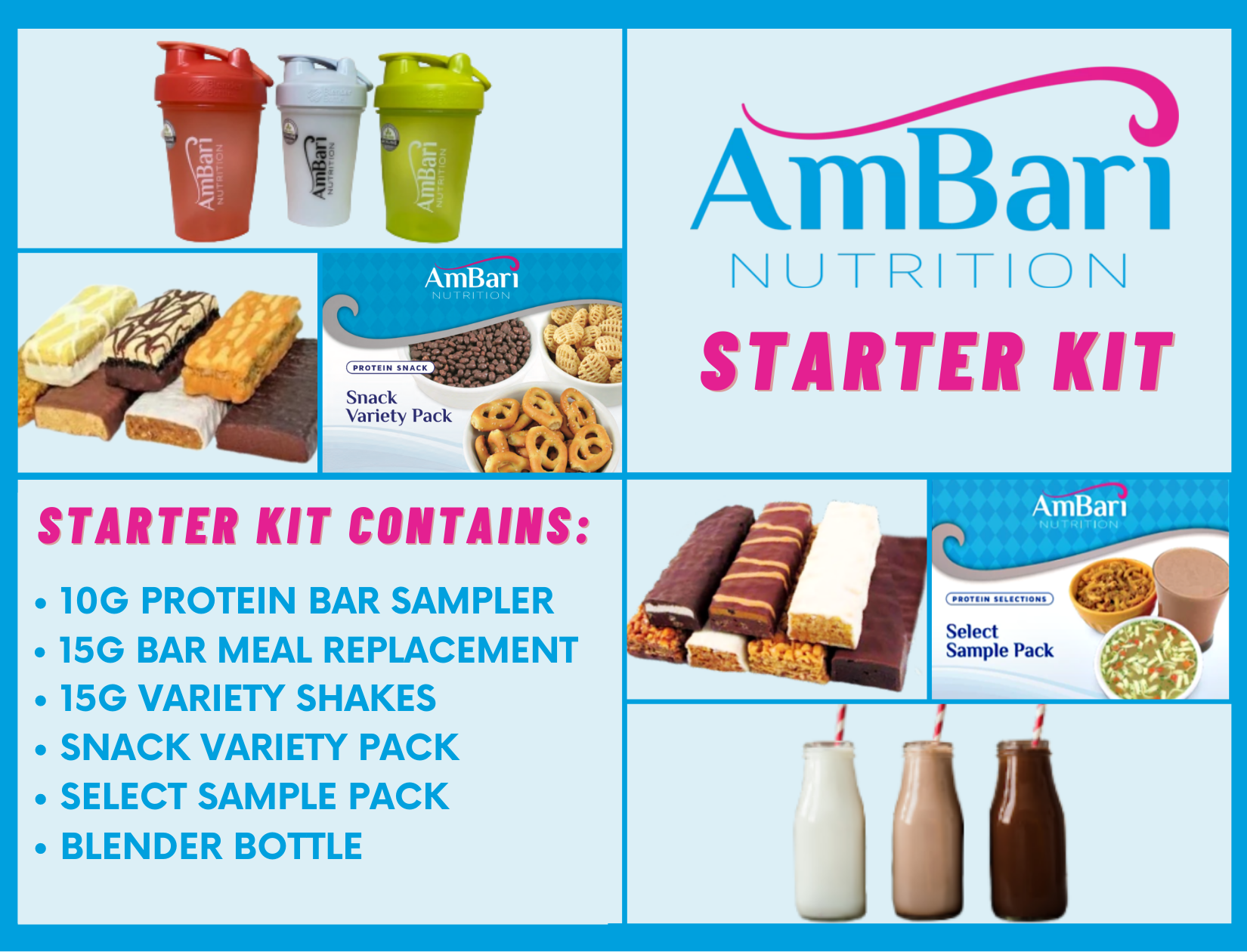Menu
Your cart is empty
Looks like you haven't added anything to your cart yet
Bariatric Soft Foods Diet: Phase 3 Post-Op Diet
Congratulations on reaching the Soft Foods phase of your bariatric journey! This stage marks an exciting transition as you begin to reintroduce more substantial foods into your diet. The Soft Foods phase typically begins 2-4 weeks after surgery and lasts for about 2-4 weeks, depending on your individual recovery and your surgeon's recommendations.
Here we've put together a collection of all the Soft Food Phase 3 appropriate products that we carry in our store to make shopping easier for you:
Brand
Dietary Concern
Product Type
Congratulations on reaching the Soft Foods phase of your bariatric journey! This stage marks an exciting transition as you begin to reintroduce more substantial foods into your diet. The Soft Foods phase typically begins 2-4 weeks after surgery and lasts for about 2-4 weeks, depending on your individual recovery and your surgeon's recommendations.
What is the Bariatric Phase 3 Diet?
The Bariatric Phase 3 Diet, also known as the Soft Foods phase, introduces foods with a soft, mashed, or pureed consistency. This phase allows you to gradually adjust to more solid foods while still being gentle on your healing stomach. It's an important step in your bariatric meal plan, helping you transition towards a long-term, sustainable diet.
Key Details About Bariatric Phase 3 Diet
| Duration | Typically 2-4 weeks (may vary based on individual recovery) |
|---|---|
| Purpose | Transition to more substantial foods while continuing healing |
| Foods Allowed | Soft meats, cooked vegetables, soft fruits, low-fat dairy, eggs |
| Foods to Avoid | Raw vegetables, tough meats, bread, nuts, seeds |
| Texture | Soft, mashed, or pureed - should be able to mash with a fork |
| Protein Goal | 60-80 grams per day (follow your dietitian's specific recommendations) |
| Fluid Goal | 64 ounces (1.9 liters) per day, separate from meals |
Importance of the Soft Foods Phase

The Soft Foods phase is crucial for several reasons:
- Gradual Food Reintroduction: It allows you to slowly introduce a wider variety of foods, helping your body adjust to different textures and nutrients.
- Continued Healing: Soft foods are still easy to digest, allowing your stomach to continue healing from surgery.
- Nutrient Diversity: This phase introduces a broader range of nutrients, supporting overall health and recovery.
- Portion Control Practice: You'll begin to learn appropriate portion sizes for your new stomach size.
- Preparation for Regular Diet: It's a stepping stone towards resuming a more normal eating pattern.
Allowed Foods in the Soft Foods Phase

During this phase, you can consume:
- Lean, ground, or finely-diced meats (chicken, turkey, fish)
- Eggs or egg substitutes
- Low-fat cottage cheese and soft cheeses
- Well-cooked, soft vegetables
- Soft, peeled fruits (bananas, canned fruits in their own juice)
- Cooked cereals (oatmeal, cream of wheat)
- Protein shakes and smoothies
- Soups with soft vegetables or puréed meats
Tips for Soft Foods Phase Success
Eating Habits
- Eat slowly, taking 20-30 minutes for each meal
- Chew foods thoroughly to a puree consistency before swallowing
- Use small utensils and take small bites
- Stop eating when you feel full or experience any discomfort
Nutrition

- Prioritize protein intake (aim for 60-80g per day)
- Include a protein source in every meal
- Use meal replacement shakes to supplement protein intake if needed
- Continue taking your prescribed vitamins and minerals
Hydration
- Continue aiming for 64 ounces of fluid per day
- Avoid drinking with meals - wait 30 minutes before and after eating
- Sip fluids slowly throughout the day
Sample Menu for Soft Foods Phase
- Breakfast: Scrambled eggs with low-fat cheese
- Mid-morning: 1/2 cup low-fat Greek yogurt
- Lunch: Tuna salad (made with low-fat mayo) and mashed avocado
- Afternoon snack: Bariatric Advantage HPMR protein shake
- Dinner: Baked fish with pureed cauliflower
- Evening snack: 1/2 banana, mashed

Remember to stay hydrated with sugar-free, non-carbonated beverages between meals.
Potential Challenges and Solutions
During the Soft Foods phase, you may encounter some challenges:
- Food Intolerance: Introduce new foods one at a time to identify any issues. If a food doesn't agree with you, wait a few days before trying it again.
- Constipation: Be sure to get adequate fluid intake and consider a fiber supplement if recommended by your doctor.
- Difficulty Meeting Protein Goals: Utilize bariatric-friendly protein shakes to supplement your intake.
Supplements and Vitamins in the Soft Foods Phase
During the Soft Foods phase, proper supplementation remains so important to prevent nutritional deficiencies and support your healing process. Your reduced food intake and the changes to your digestive system make it challenging to get all necessary nutrients from food alone.
Key Supplements for Bariatric Patients

- Multivitamins: A high-quality bariatric multivitamin is essential. The Bariatric One-A-Day Multivitamin is formulated specifically for post-surgery needs.
- Calcium: Calcium supplements help maintain bone health. Consider Calcium Chewy Bites for an easy-to-take option.
- Vitamin B12: B12 deficiency is common after bariatric surgery. The Vitamin B12 SpeedyMelts offer a convenient sublingual form.
- Iron: Iron supplements may be necessary, especially for menstruating women. The Iron Chewable tablets are gentle on the stomach.
- Vitamin D: This vitamin is important for calcium absorption and overall health. It's often included in calcium supplements or multivitamins.
Always consult with your healthcare provider about your specific supplement needs, as they may vary based on your surgery type and individual health status. For more information on bariatric vitamins, check out our guide on The Best Bariatric Multivitamins.
"The soft foods phase is when we really start to focus on getting a variety of nutrients back into your diet. But remember, supplements are still crucial at this stage. They're not just a recommendation - they're a necessity for your long-term health after bariatric surgery." - Dr. K. Huffman, Bariatric Surgeon
Consider using a pill organizer or setting reminders on your phone to ensure you're taking your supplements consistently. As you progress through your recovery, your supplement regimen may be adjusted, so stay in close communication with your healthcare team.
Transitioning to the Next Phase
As you near the end of the Soft Foods phase, your doctor or surgical team will assess your progress. If you're tolerating soft foods well, you'll gradually transition to the regular bariatric diet. This transition should be slow and guided by your doctors or surgeon.
Conclusion
The Soft Foods phase is an exciting step in your bariatric journey. It marks significant progress in your recovery and brings you closer to a more normal eating pattern. Remember to follow your surgical team's instructions, focus on protein intake, and listen to your body. With patience and dedication, you'll successfully get through this phase and continue on your path to better health.
Writer: Carrie H. Carrie is a passionate health and nutrition writer with a strong foundation in medical and scientific research. Driven by her commitment to helping others lead healthier lives, she immerses herself in the latest scientific findings. Carrie excels at translating evidence-based knowledge into practical advice, ensuring that her readers receive accurate and valuable information on health, nutrition, and wellness. Through her writing, she aims to empower individuals to make informed decisions about their well-being. |
Reviewed By: Dr. Kevin Huffman Dr. Kevin D. Huffman, D.O., is a renowned board-certified bariatric physician dedicated to the treatment of obesity. His expertise has made him a sought-after trainer for healthcare providers, and he founded American Bariatric Consultants to develop protocols and training materials trusted by medical societies, pharmaceutical companies, patients, and hospitals alike. Beyond patient care, Dr. Huffman's influence extends to preparing physicians for board certification, thereby expanding access to this crucial treatment. Dr. Kevin D. Huffman, D.O., is a renowned board-certified bariatric physician dedicated to the treatment of obesity. His expertise has made him a sought-after trainer for healthcare providers, and he founded American Bariatric Consultants to develop protocols and training materials trusted by medical societies, pharmaceutical companies, patients, and hospitals alike. Beyond patient care, Dr. Huffman's influence extends to preparing physicians for board certification, thereby expanding access to this crucial treatment. |
- Choosing a selection results in a full page refresh.



































